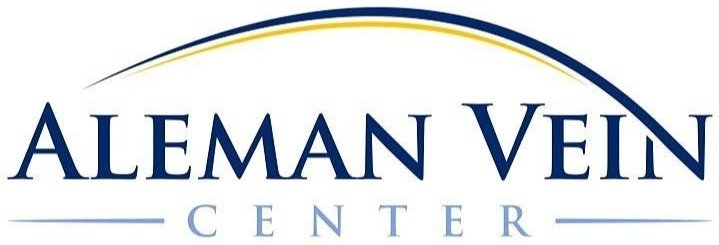
How Are Varicose Veins Treated?
Procedures to Treat Varicose Veins
Once you are finished with your evaluation for vein disease, you will discuss the results with leading Atlanta vein specialist, Dr. Chad Aleman. If vein treatment is needed, options will be discussed before moving forward with any plan. If varicose vein treatments are not warranted or not in your best interests, we will discuss alternate diagnoses or conservative treatment options. Often, your insurance company or Medicare will require a trial of conservative treatment to determine if they consider treatment medically necessary. If so, we will be able to prescribe the appropriate conservative treatment and arrange for follow-up to assess the results. If it is determined that vein treatment is required, you don’t need to worry. You’re in good hands with the Aleman Vein Center team!
Vein treatment has been revolutionized with state of the art ultrasound and minimally-invasive procedures. Modern treatment for varicose vein disease is more effective than historical surgical treatments that required general anesthesia and hospitalization followed by a long, painful recovery. Traditional vein treatment typically involved varicose vein removal or varicose vein surgery. Our modern approach to varicose vein treatment is done in our Atlanta vein clinic and without the need for anesthesia. Our vein treatments take less than an hour. Because there is no need for sedation, you can drive home or back to work and resume normal daily activities right away. You should eat a normal meal and drink plenty of fluids before coming in for treatments. Unless specifically told to hold any of your medications, you should take all of them as you normally would on the day of the vein procedures.
Radiofrequency Ablation
Radiofrequency Vein Ablation (Vein Closure) is a common treatment for varicose veins that involves inserting a tiny catheter into the failed vein under real-time ultrasound guidance. The procedure is very simple and done in our vein clinic while you are awake and speaking to us. A local anesthetic (“numbing medicine”) is placed around the vein so that there is minimal discomfort during the procedure. After the vein is numbed and the catheter is in place, heat is applied to the inside of the vein in order to collapse it or cauterize it closed. Over time, your body will break down the closed vein and it will disappear.
If any of that seems scary, don’t worry. It really is one of those things that sounds far worse than it is. Upon completion of the vein ablation, we commonly hear patients state, “That’s it? That wasn’t nearly as bad as I imagined it would be!”
Varithena
Varithena is a proprietary microfoam medication that is FDA approved to treat or ablate saphenous veins and large varicose veins. Because this treatment does not use heat or a long catheter, it can be used in areas where the radiofrequency can not be used, such as near nerves in the lower leg or in very curved veins.
In this procedure, the doctor administers the medication by injecting it through a tiny catheter or needle directly into the diseased vein. The medication pushes the blood out of the vein and comes into direct contact with the wall of the vein causing damage to the wall lining. This damage causes the vein to collapse closed and break down.
VenaSeal™
Similar to Radiofrequency Ablation, VenaSeal™ (or endovenous adhesive vein ablation) involves inserting a small catheter into the vein after a local numbing shot. Once the catheter is in place, a medical grade adhesive is injected into the vein in order to glue the vein permanently closed. This procedure is nearly painless. It is performed in the office and without the need for sedation. The typical procedure time is about 30 minutes.
Ultrasound Guided Foam Sclerotherapy
Ultrasound Guided Foam Sclerotherapy has been used for decades to safely and effectively treat varicose veins. In conjunction with detailed ultrasound mapping, sclerotherapy is the “Swiss Army Knife” of vein treatment capable of treating any failed vein. Despite that, many physicians who treat veins have never been trained on how to properly perform this procedure, so they mistakenly believe that it doesn’t work. Just like any treatment, it doesn’t work if it isn’t done correctly and this one is very dependent on the skill and expertise of the provider. Fortunately, Dr. Aleman has obtained that expertise through training and by personally performing tens of thousands of cases of ultrasound guided foam sclerotherapy.
In this procedure, medication is injected into the failed varicose veins through a needle and under real-time ultrasound visualization. The medication is called a sclerosant, which means that it scars the veins closed by damaging their inner lining. The target of this procedure are the branches of the veins treated with the vein ablation. Often, these are the bulging and ropey varicose veins.
In foam sclerotherapy, the medication is a detergent solution (yes, a soap!) that is in a foam form containing microscopic bubbles. In a foam form, the medication is much more effective at filling and treating larger varicose veins. It is also visible on the ultrasound as the treatment is done so that we can see that the target veins are treated. The foam remains in the target vein just long enough to cause sufficient damage and close the vein. Soon after injection, the foam is inactivated and clears out of your body while the vein scars closed and is broken down by the body. Over time, the veins gradually break down and disappear. It is as if you had undergone a varicose vein removal without varicose vein surgery!
Spider Vein Treatment
Visually guided sclerotherapy is used to treat cosmetic spider veins. Spider veins are the tiny veins visible to the naked eye right at the skin surface. In this procedure, a tiny needle is used to inject the sclerosant directly into the spider veins. After injection, the spider veins collapse, scar close, and begin to break down. While there are surface lasers that treat spider veins, sclerotherapy is still considered the treatment of choice as it is more effective and less painful than surface laser.
Send us a message if you would like more information or if you would like to schedule an appointment at our Atlanta vein clinic.
By clicking submit, you agree to receive communications from Aleman Vein Center at the contact provided on this form. To view our Privacy Policy and Terms of Service, click here: https://www.alemanvein.com/notice-of-privacy-practices






